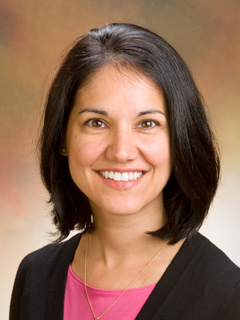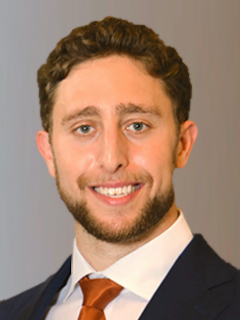HOW CAN WE HELP YOU? Call 1-800-TRY-CHOP
In This Section
ASCI Membership, STAT Madness, Brain Chart, Single Ventricle Research Fund

In this week's news roundup, we're celebrating the achievements of physician scientists at Children's Hospital of Philadelphia. Dr. Sandra Amaral joins the American Society of Clinical Investigation, two CHOP researchers participate in STAT Madness, a CHOP-led team wins a top prize in an NIH research challenge, two investigators receive grants for single ventricle research, and a nurse scientist issues a call to action for developmental care for infants with congenital heart disease.
Dr. Sandra Amaral Joins the American Society of Clinical Investigation
The American Society for Clinical Investigation (ASCI) elected Sandra Amaral, MD, MHS, as a new member. The society's primary goal is to support physician scientists in their "scientific efforts, educational needs, and clinical aspirations" to improve health all over the world. Founded in 1908, the ASCI Council considers hundreds of member nominations every year. Elected members include physician scientists from all medical specialties and are held to the highest standards of respect, integrity, and professionalism.
Dr. Amaral is medical director of the Kidney Transplant and Hand Transplant programs, and she leads the Kidney Transplant Transition Clinic Program. In addition, she founded and serves as director for the CHOPed Cooking Camp for youth with kidney disease, and is a core faculty member of Clinical Futures, a Research Institute Center of Emphasis, and an associate professor of Pediatrics and Epidemiology at the Perelman School of Medicine at the University of Pennsylvania.
Dr. Amaral's research focuses on kidney transplantation with an aim to reduce treatment burden in adolescents and young adults through studies that show how medication regimens could be easier to follow. She is currently the principal investigator of Urological and Renal Disease Engaging Adolescents in Adherence Collaborative Trial (U-REAACT) that promotes treatment adherence in youth, and co-principal investigator of VIRTUUS Children's Study, an international study that examines urinary biomarker signals. Dr. Amaral serves on the American Society of Pediatric Nephrology Council and advocates regularly for children and young adults with renal disease and their caregivers.
New members will officially join the society at the ASCI Dinner and New Member Induction Ceremony April 21.
Read more in this CHOP news release (log in required).
Vote for CHOP Biomedicine Studies in STAT Madness
STAT's annual STAT Madness challenge selected two separate studies from CHOP to participate in a contest that highlights some of the best research in biomedicine. The top 64 entries must demonstrate originality and scientific rigor, as well as suggest a strong potential impact. These studies are bracketed against each other March Madness style until one winner remains.
The first study selected details the development of a novel tool, CancerVar, that uses machine-learning to identify somatic cancer mutations and interpret possible significance for diagnosis, prognosis, and targetability. Kai Wang, PhD, a genomic and bioinformatics scientist at CHOP, is the co-senior author on the paper along with Yunyun Zhou, PhD, a data scientist in the Intellectual and Developmental Disabilities Research Center Biostatistics and Data Science Core. This computational tool bridges the knowledge databases of millions of somatic cancer variants into one accessible server for standardized clinical interpretation.
"CancerVar documents and harmonizes various types of clinical evidence including drug information, publications, and pathways for somatic mutations in detail," said Dr. Wang, who is also a professor of Pathology and Laboratory Medicine at the University of Pennsylvania. "By providing standardized, reproducible, and precise output for interpreting somatic variants, CancerVar can help researchers and clinicians prioritize mutations of concern."
The second study in the STAT Madness challenge outlines new software developed by researchers from CHOP and New Jersey Institute for Technology. The single-cell multimodal deep clustering (scMDC) software uses machine learning to analyze data about different characteristics of a single cell, such as gene expression and messenger RNA, which becomes extremely useful when studying cancers that may only affect a small portion of cells. Hakon Hakonarson, MD, PhD, director of the Center for Applied Genomics, is the senior author on the study.
Dr. Hakonarson describes the tool as "a significant advancement [that] allows us to integrate and put all of this information into biological perspective, which is particularly important when considering information on different diseases."
The first round of voting for STAT Madness opened on March 1. Cast your vote.
Learn more about the studies nominated for STAT Madness in CHOP press releases about CancerVar and scMDC.
Dr. Jakob Seidlitz and Brain Chart Team Win Grand DataWorks! Prize
A new partnership between the National Institutes of Health Office of Data Science Strategy and Federation of American Societies for Experimental Biology seeks to promote data sharing and reuse in scientific research through an incentivized challenge: the DataWorks! Prize. Jakob Seidlitz, PhD, a postdoctoral fellow at CHOP, and his Brain Chart team earned one of two $100,000 grand prizes.
Lead by Dr. Seidlitz and Richard Bethlehem, PhD, an assistant professor of Psychology from the University of Cambridge, a team of more than 200 scientists, including Aaron Alexander-Bloch MD, PhD, director of the Brain Gene Development Lab at CHOP and assistant professor of Psychiatry at the Perelman School of Medicine at the University of Pennsylvania, worked across their institutions to collect and create a shareable resource for one of the largest MRI datasets with information from more than 100,000 people. The team made their data readily available online to encourage reproducibility and to honor a key part of the DataWorks! Challenge — offering an opportunity for the research community to learn from peers and apply those lessons to their research practices.
Standardizing the assessment of brain development is a crucial step in the advancement of diagnosing neurodevelopmental diseases through all stages of life, such as autism spectrum disorder in childhood and Alzheimer's disease in adulthood. Brain Charts for the Human Lifespan created comprehensive life-spanning charts that utilize common MRI metrics to map quantitative milestones in the brain through the lenses of age and sex, similar to pediatric growth charts. Making the data accessible to other researchers allows for future validation to the research as discoveries are made and will hopefully come to include a much broader range of currently under-represented demographics.
"Since the initial publication last year, we have begun many projects to extend the technical capabilities of the brain charts and to explore various clinical applications," Dr. Seidlitz said. "Some of the most exciting projects are being pursued at CHOP in collaboration with other members of the Lifespan Brain Institute, as well as faculty and researchers in other departments — Pediatrics, Radiology, and Neuro-oncology, just to name a few. We plan to leverage the funds to simultaneously improve and optimize our brain chart pipeline while also pushing the research forward."
Read more about their research via the University of Cambridge and learn more about the DataWorks! Prize winners.
Drs. Jolley and Pei Receive Single Ventricle Research Fund Grants
Matthew Jolley, MD, assistant professor and attending physician in the Center for Pediatric Heart Valve Disorders, and Liming Pei, PhD, investigator in the Department of Pathology and Laboratory Medicine received grants through the 2022 Single Ventricle Research Fund (SVRF), offered by Additional Ventures. The program supports researchers who seek to advance the care of patients with single ventricle heart defects through researching key areas of genetics, cardiovascular development, and computational models.
The SVRF recognized Dr. Jolley for his research surrounding the use of image-derived computational modeling to assist in valve repair in children with congenital heart disease. His team aimed to create an open-source computational framework for image-derived valve analysis that brought together two open-source tools: modeling platform SlicerHeart and modeling software FEBio.
Dr. Pei, who is also an associate professor of Pathology and Laboratory Medicine at Penn, received support for his research on Fontan circulation as a strategy for care of single ventricle congenital heart disease. His work examines the possibly life-threatening complications that arise from this method of care, most notably hepatic fibrosis, also known as Fontan-associated liver disease.
View the SVRF announcement to learn more about the 2022 grant recipients.
Nurse Scientist Calls for Development of Early Interventions for Infants With Congenital Heart Disease
CHOP Nurse Scientist Amy Jo Lisanti, PhD, RN, CCNS, CCRN-K, is first author on a Science Advisory that examined why developmental care for infants with complex congenital heart disease should become an area of critical focus in the next decade.
A developmental care approach individualizes care through observation and interpretation to appropriately meet the expectations of an infant's developing brain. The advisory describes the burden of developmental disorders and delays in infants with congenital heart disease and identifies opportunities to improve neurodevelopmental outcomes using developmental care interventions. Dr. Lisanti and colleagues published a call to action for scientists, clinicians, and policy makers that prioritizes funding research dedicated to the care of children with complex congenital heart disease.
"Developing early interventions to promote brain maturation, mitigate risk factors, and change the trajectory of neurodevelopment are now urgent research priorities," said Dr. Lisanti, research assistant professor at University of Pennsylvania School of Nursing.
Read more in the Journal of the American Heart Association.
ICYMI
Catch up on our headlines from our Feb. 17 In the News:
- $25 Million Donation to Support Creation of New Research Center
- CHOP Receives First Grant from Gates Foundation
- Program Supports Community-engaged Research Initiatives
- Neurological Disease Concept Models Help Improve Quality of Life
- Mentored Research Pilot Grant Supports Findings on Maternally Derived Antibodies
Keep up with our news, stories, and updates in real time by following us on Twitter, LinkedIn, or Instagram. Meet the minds behind the science in the Bench to Bedside podcast. Or subscribe to our newsletter to get an email sent every other Friday by signing up here.





